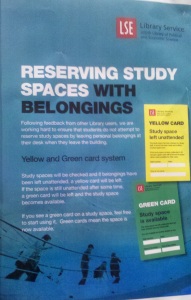https://twitter.com/DonnaLanclos/status/540870419348480000
(Note: this is one of two posts I wrote this week about Open Access publishing. You can read the other one here at the EPIC people blog).
I spent nearly all of my time at #AAA2014 this year talking and thinking about libraries, publishing, open access (OA), and anthropology. The crowd with which I was talking included anthropologists, of course, but also librarians, publishers, and hybrid people who were a little bit of all three categories. Informal conversations in the book room (the lovely oasis in the middle of the conference-hotel-chaos) were a prelude to my attendance at the Friday morning session on open access publishing in anthropology (one of the SCA-sponsored events listed here). The panelists presented a variety of perspectives on open access, some nuts-and-bolts type “you need to be able to deal with funding/curation/discovery” discussions, and some much more theoretical “what does publishing mean” and “what would an open-practice (not just an open-access) anthropology look like?”
https://twitter.com/DonnaLanclos/status/540870606515101696
https://twitter.com/DonnaLanclos/status/540871085047431168
https://twitter.com/DonnaLanclos/status/540871291008724993
https://twitter.com/DonnaLanclos/status/540872383163551744
https://twitter.com/DonnaLanclos/status/540873354866339840
https://twitter.com/DonnaLanclos/status/540873465163948032
You can see from my tweets that I fairly quickly disagreed with the framing of part of the problem of OA–da Col is problematizing an approach to OA publishing that frames it within a gift economy, but in my experience the process of publishing scholarly communications is firmly perceived within the market–by publishers, and by scholars. Scholars are in the market of exchanging their publications for academic success. Publishers are in the business of selling scholarship back to the very scholars who produce the content. I wonder if there is some conflation between the prevalent “The Internet is Free” narrative that libraries often have to encounter in justifying their existence within higher ed, with the “Content should be accessible” narrative that is more vividly shot through discourses around OA publishing. I was especially frustrated at this approach from da Col, whose experiences with HAU as an OA publication seem to be an excellent model for some. I would have liked to have heard more about the actual transformations of scholarly practice possible within the existing innovations at HAU.
https://twitter.com/DonnaLanclos/status/540873731850387456
https://twitter.com/DonnaLanclos/status/540876430645932032
https://twitter.com/DonnaLanclos/status/540873834732453888
https://twitter.com/DonnaLanclos/status/540883831931564033
This came up a lot, the “self-publishing” phrase, and perhaps it’s shorthand for “not-by-publishers” publishing, but I think it’s potentially dangerous to talk about OA this way, because it communicates to scholars that they need to DIY themselves through open access. When what they actually should be doing is collaborating with people in libraries and publishing who are already engaging in open access practices (e.g.: Duke, University of Chicago press, HAU, etc. etc.). Cultural Anthropology, and in particular Tim Elfenbein, have offered themselves and what they have learned from their experiences so far. I think what frustrated me most about the tone of the SCA panel on OA was its cautious negativity. “This is hard.” “We didn’t think of this” When it’s clearly do-able, even with challenges.
https://twitter.com/DonnaLanclos/status/540879445939470337
At the same time that everyone in the room seemed to agree that it is important to figure out how to get to OA.
https://twitter.com/DonnaLanclos/status/540874011262324737
https://twitter.com/DonnaLanclos/status/540874513010143232
I particularly appreciated the perspective of Jessica Cattelino, outgoing SCA treasurer, who even as she detailed some of the financial nitty-gritty behind open access, opened the discussion up to a consideration of what might be possible once more of us engage in these kinds of publishing practices.
https://twitter.com/DonnaLanclos/status/540877386032873472
https://twitter.com/DonnaLanclos/status/540877637670141952
https://twitter.com/DonnaLanclos/status/540879287071821824
https://twitter.com/DonnaLanclos/status/540877886295908353
This was another theme that came up again and again–publishing is a particular kind of expertise, and scholars in anthropology (and other disciplines) don’t necessarily have it. The solution, to me, is not to insist that anthropologists become publishers, but rather to point to opportunities to collaborate with people who have the necessary expertise (again: librarians and publishers).
https://twitter.com/DonnaLanclos/status/540880236519624704
https://twitter.com/DonnaLanclos/status/540885281860505600
https://twitter.com/DonnaLanclos/status/540884920210821121
Even with the optimistic talk about what an open-practice open-access anthropology might look like, the SCA panel left me with an overwhelming sense of the anxiety that academics carry into conversations about OA publishing. And, no wonder–academics in all fields perceive traditional publishing as what they exchange for their success in academia. But some of the anxiety stems, surely, in part from the fact that one can publish in academia, in high impact journals, and still not have full time (let alone tenure-track) academic work.
In the Global Social Media panel, Danny Miller’s team of ethnographers presented on their (very cool) work on social media practices around the world, and made the point of saying that the outputs of their research were all going to be CC-licensed OA materials, and not just in text format.
https://twitter.com/DonnaLanclos/status/540652703836540928
https://twitter.com/DonnaLanclos/status/540653083903397888
This is a high-viz, well-funded anthropology project, and its unconventional approach to communicating their research results (scholarly and otherwise) could serve as another model for what it looks like to be OA in our discipline.
The need to be OA resonated nicely with the theme of the Popular Anthropology “Installation” on Friday afternoon, where a panel of anthropologists discussed, among other things, the persistent need for anthropologists and anthropological thinking to reach wider audiences. OA is going to be a crucial tool in this. We need to have more engagement with the public, not less, and in particular need to not play status games with those in our field who are particularly good at popularizing anthropology. And we should make it clear that anthropological voices can and should be relevant, should speak to concerns of people outside of anthropology, not limit themselves to speaking in closed disciplinary circles. Anthropological voices, with a few exceptions, are largely missing from national conversations around education, health, politics, race, and a whole range of structural inequalities. We cannot sit back and expect that to change just because we have something to say. We need to take our contributions to the public, engage with them, make ourselves visible.
I was so pleased with our roundtable discussion on Saturday morning, “Anthropological Knowledge: Access, Creation, and Dissemination in the Digital Age” My colleague Juliann Couture co-organized this panel along with Richard Freeman–both of them are librarians, and the tone of the discussion in our roundtable contrasted remarkably with that of the SCA, in part because there were so many people in our room (even though it was a smaller crowd) who actually knew how OA could be (and was being) done, not just at Cultural Anthropology, but across the discipline, and even outside of it.
https://twitter.com/DonnaLanclos/status/541272507375161345
https://twitter.com/DonnaLanclos/status/541273441803198464
https://twitter.com/DonnaLanclos/status/541274003089154049
https://twitter.com/DonnaLanclos/status/541274403427074048
Matt Thompson blogs for Savage Minds. The list Matt has complied of current OA journals in anthropology is a valuable tool, for those interested in current practices, and for the journals themselves, to be able to identify important holes in how they are doing OA, and where they need to improve what they are doing to maximize access and discovery. Also in the room with us on the panel was Tim Elfenbein, who by now is one of the most experienced OA publishers in Anthropology (along with the gang at HAU).
https://twitter.com/DonnaLanclos/status/541274838250565632
https://twitter.com/DonnaLanclos/status/541275165817315329
It is frustrating for me to witness anthropologists, who complain mightily when people outside of our discipline assume that our methods and theoretical approaches are intuitive, easy, and unproblematically acquired, do the same thing about other professions. There are entire professions out there (I repeat myself for a reason: LIBRARIANS AND PUBLISHERS) who can be partners with us in OA. We need to reach out to and collaborate with them. SCA already is with Duke Libraries HAU already is with the University of Chicago. We have OA policies and journals at UNC Charlotte. These and others can be models for the smaller society sections worried about how to do this and what would it look like, and will they lose their identity? I think an argument can and should be made to the smaller society sections that the content of their journals, once they are converted to OA, can be more visible than now, to the greater good of their community of scholars and to the people who now have access to it.
Because it’s not just about being “accessible,” as anyone who works in libraries and publishing can tell you, it’s about being “discoverable,” and that’s a whole ‘nother thing.
https://twitter.com/DonnaLanclos/status/541275795118120960
https://twitter.com/DonnaLanclos/status/541276599791149056
https://twitter.com/DonnaLanclos/status/541277687999107074
Other fields can help. There are models out there.
@DonnaLanclos #AAA2014 #AAA2015 #OA this piece might also be of interest: http://t.co/P9isSTcyVT
— Martin Paul Eve (@martin_eve) December 9, 2014
https://twitter.com/EditorNHays/status/542736284947451904
Because when we talk about OA publishing, we are not just talking about OA publishing.
https://twitter.com/DonnaLanclos/status/541280503895433216
Notes:
Our panel abstract here, for those who can’t get into the (#ironyclaxon) AAA proceedings:
This session would be of particular interest to:
Practicing and Applied Anthropologists, Students, Those involved in mentoring activities

